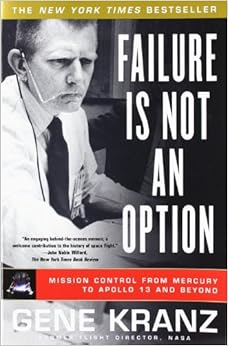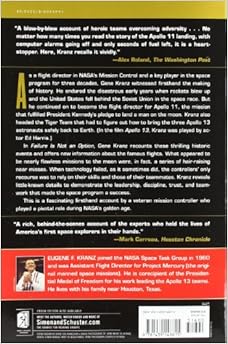Amazon.com Review
In 1957, the Russians launched
Sputnik and the ensuing space race. Three years later, Gene Kranz left his aircraft testing job to join NASA and champion the American cause. What he found was an embryonic department run by whiz kids (such as himself), sharp engineers and technicians who had to create the Mercury mission rules and procedure from the ground up. As he says, "Since there were no books written on the actual methodology of space flight, we had to write them as we went along."
Kranz was part of the mission control team that, in January 1961, launched a chimpanzee into space and successfully retrieved him, and made Alan Shepard the first American in space in May 1961. Just two months later they launched Gus Grissom for a space orbit, John Glenn orbited Earth three times in February 1962, and in May of 1963 Gordon Cooper completed the final Project Mercury launch with 22 Earth orbits. And through them all, and the many Apollo missions that followed, Gene Kranz was one of the integral inside men--one of those who bore the responsibility for the Apollo 1 tragedy, and the leader of the "tiger team" that saved the Apollo 13 astronauts.
Moviegoers know Gene Kranz through Ed Harris's Oscar-nominated portrayal of him in Apollo 13, but Kranz provides a more detailed insider's perspective in his book Failure Is Not an Option. You see NASA through his eyes, from its primitive days when he first joined up, through the 1993 shuttle mission to repair the Hubble Space Telescope, his last mission control project. His memoir, however, is not high literature. Kranz has many accomplishments and honors to his credit, including the Presidential Medal of Freedom, but this is his first book, and he's not a polished author. There are, perhaps, more behind-the-scenes details and more paragraphs devoted to what Cape Canaveral looked like than the general public demands. If, however, you have a long-standing fascination with aeronautics, if you watched Apollo 13 and wanted more, Failure Is Not an Option will fill the bill. --Stephanie Gold
--This text refers to an out of print or unavailable edition of this title.
From Publishers Weekly
When the heroic American astronauts of the '60s and '70s inquired, "Houston, do you read?" it was often Krantz's team who answered from the ground. Veteran NASA flight controller Krantz (portrayed by Ed Harris in the film Apollo 13) has written a personable memoir, one that follows his and NASA's careers from the start of the space race through "the last lunar strike," Apollo 17 (1972-1973). Krantz's story opens in the world of the first U.S. space scientists, of exploding Mercury-Atlas rockets, flaming escape towers and "the first rule of flight control": "If you don't know what to do, don't do anything!" Its climax is Apollo 13, with Krantz serving as "lead flight director" and helping to save the trapped astronauts' lives. His account of that barely averted disaster evokes the adrenalized mood of the flight controllers and the technical problems ("gimbal lock," oxygen status, return trajectories) that had to be solved for the astronauts to survive. Elsewhere in these often-gripping pages we learn of the quarrels that almost derailed Gemini 9A's spacewalk; "the best leaders the program ever had," among them George Mueller, who revived NASA after a 1966 launchpad fire; the forest of internal acronyms and argot ("Go-NoGo," "all-up," EVA, the Trench, CSM, GNC, FIDO, RETRO, GUIDO); and the combination of teamwork and expertise that made the moon landings possible. Plenty of books (and several films) have already tried to depict the space program's excitement; few of their creators had the first-person experience or the attention to detail Krantz has, whose role as flight control "White" his readers will admire or even wish to emulate. Eight b&w photos. (Apr.)
Copyright 2000 Reed Business Information, Inc.
--This text refers to an out of print or unavailable edition of this title.







